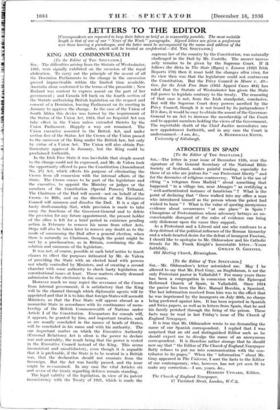KING AND COMMONWEALTH
LETTERS TO THE EDITOR
[Correspondents are requested to keep their letters as brief as is reasonably possible. The most suitable length is that of one of our "News of the Week" paragraphs. Signed letters are given a preference over those bearing a pseudonym, and the latter must be accompanied by the name and address of the author, which will be treated as confidential.—Ed. THE SPECTATOR.] [To the Editor of THE SPECTATOR.] SIR,—The difficulties arising from the Statute of Westminster, 1981, were signally exhibited on the occasion of the royal abdication. To carry out the principle of the assent of all the Dominion Parliaments to the change in the succession proved impracticable within the limited time available. Australia alone conformed to the terms of the preamble ; New Zealand was content to express assent on the part of her government ; and Canada fell back on the fourth section of the Statute authorising British legislation on the request and consent of a Dominion, leaving Parliament on its meeting in January to approve the change. In the ease of the Union of South Africa this device was barred by the requirement of the Status of the Union Act, 1934, that no Imperial Act can take effect in the Union unless extended thereto by the Union Parliament. Happily a way out remained. The Union executive assented to the British Act, and under section five of the Status Act the Crown of the Union passed to the successor of the King under the British law, but only by virtue of a Union Act. The Union will also obtain Par- liamentary approval in January, but the King could be proclaimed forthwith.
In the Irish Free State it was inevitable that simple assent to the change could not be expressed, and Mr. de Valera took the opportunity offered to pass the Constitution (Amendment No. 27) Act, which effects his purpose of eliminating the Crown from all connexion with the internal affairs of the State. The Crown ceases to be part of the legislature and the executive, to appoint the Ministry or judges or the members of the Constitution (Special Powers) Tribunal. The Chairman of the Dail will assent—not on behalf of the Crown—to Bills, and on the direction of the Executive Council will summon and dissolve the Dail. It is a sign of hasty draftsmanship that, while provision is made to take away the functions of the Governor-General and to delete the provision for any future appointment, the present holder Of the office is left for a brief period in existence pending action in February to remove his name from other Acts. Steps will also be taken later to remove any doubt as to the mode of summoning the Dail after a general election, when there is naturally no Chairman, though the point might be met by a proclamation, as in Britain, combining the dis- solution and summons of the legislature.
It was not, of course, possible at such brief notice to insert clauses to effect the purposes intimated by .Mr. de Valera of providing the State with an elected head with powers not wholly controlled by Ministers, and of creating a second chamber with some authority to check hasty legislation on constitutional issues at least.. These matters clearly demand submission to the electorate in due course.
However _much we may regret the severance of the Crown from internal government, it is satisfactory that the King will, be the channel through which diplomatic agents will be appointed and that it is to him that foreign States will accredit Ministers, so that the Free State will appear abroad as a monarchic State in accordance with its continuance of mem- bership of the. British .Commonwealth of Nations under Article I of the Constitution. Exequaturs for consuls will, it appears, be granted by . him, and important treaties, such as are usually concluded in the names of heads of States, will be concluded in his name and with his authority. The one important matter on which the Executive Authority (External Relations) Act is silent is the power to declare war and neutrality, the result being that the power is vested in the Executive Council instead of the King.. This seems inconsistent and unsatisfactory, even though it is arguahle that it_is preferable, if the State is to be neutral in a British war, that the declaration should not emanate from the Sovereign. But the Act was hastily passed, and the issue might be' re-examined. In 'any ease' the vital Articles six and seven of the treaty regarding defence remain standing.
The legal validitS- of the legislation, in . view of its Patent inconsistency with the Treaty of 1921, iVhiCh is niade the
supreme law of the country by the Constitution, was naturally challenged in the Dail by Mr. Costello. The answer necess- arily remains to be given by the 'Supreme Court. If it follows the dicta in The State (Ryan) v. Lennon (1935 Irish Reports 170) then it must hold the changes ultra tires, for its view then was that the legislature could not contravene the Constitution. But the Privy Council in Moore v. Alt.- Gen. for the Irish Free State (1935 Appeal Cases 484) has ruled that the Statute of Westminster has given the State full power to legislate contrary to the treaty. The reasoning of that case is not, from the Irish standpoint, conclusive. But will the Supreme Court deny powers ascribed by the Privy Council, though it is not bound by its jurisprudence ? If it does, it would be easy to obtain the assent of the Governor- General to an Act to increase the membership of the Court and to appoint members holding the views of the Government. The regrettable death of the Chief Justice necessitates one new appointment forthwith, and in any case the Court is










































 Previous page
Previous page